- Home
- Lauren Willig
The Mark of the Midnight Manzanilla Page 8
The Mark of the Midnight Manzanilla Read online
Page 8
His mother, a spy? “My mother was a botanist.” Plants seldom took sides in the affairs of nations.
“With strong political views. I am sure she meant well by it,” Uncle Henry added clumsily. “She had no idea—how could she?—that it would end as it did.”
Setting his glass down, Uncle Henry looked intently at Lucien. “I have always believed that it was her contact who killed her. Who killed them both.”
Chapter Five
“Her contact?” Lucien echoed.
Spies . . . contacts . . . The whole story was fantastical. Lucien dug back into his memories, his mother in her greenhouse, his father in his bookroom, both engaged in their respective pursuits, light streaming through the long windows. Whenever he remembered the house of his youth, he remembered light, glinting off the glass panes, sparkling off the mirrors, catching the curves of the gilded picture frames.
Everything had been airy and open, no place for clandestine meetings or murmured secrets.
As for his parents, the very idea of his mother betraying his father’s trust in that way—it just didn’t bear considering. They had been the very picture of marital harmony.
Unless it was just that, a picture, a construction of artifice and illusion. Pictures, by their very nature, lied.
“That’s absurd,” Lucien said flatly. He had the evidence of his own eyes, didn’t he?
For the few hours a day in which his parents had visited his schoolroom. What about all those other hours? What about all those aspects of their lives of which he knew nothing?
“Is it?” Uncle Henry looked grave. “You were very young at the time, too young, perhaps, to realize how high feelings ran. And your mother . . . She was never one to mask her beliefs.”
“True.” That much, Lucien couldn’t argue with; both parents had been outspoken in their beliefs. Their debates seemed to delight them both, his father’s cynical pragmatism pitted against his mother’s more abstract ideals. “But belief and action are very different things.”
“For some, perhaps,” said Uncle Henry quietly. He rose, using the poker to stir the coals on the grate. Ash sifted down, the smell acrid in the small room. “For some.”
Lucien opened his mouth to argue. And closed it again.
He couldn’t believe that his mother would ever have betrayed his father’s trust in the normal course of things—but what if the freedom of an island of men weighed on the other side of the balance? It didn’t take much imagination to see where a few paltry snippets of information would seem a minor price to pay.
Even if it meant placing his father’s honor in jeopardy?
Everything Lucien had thought black-and-white was suddenly murky; his head ached as it had the first summer he had spent in Louisiana, when he had contracted marsh fever and woken to find that his tongue was too big for his mouth and the sun made his eyes ache.
“What made you suspect my mother of . . . relaying information?” Lucien asked gruffly.
Uncle Henry paused with the poker in his hand. After a moment he said, “Small things. Your father complained of papers gone missing, his desk disarranged. He was always very nice in his arrangements.”
“The servants—,” Lucien began.
“Knew better than to touch your father’s papers.” Uncle Henry replaced the poker in its stand. “Your mother seemed . . . distracted those last few months. Distraught. Her behavior was erratic. She pleaded a headache and retired early from the theater but returned home late. On another day, I came across her in a part of town she didn’t usually frequent—inquiring after a rare plant, she told me, but then why not take the carriage?”
“I don’t remember any of this,” said Lucien frankly.
“Why would you? You were in the schoolroom. Although,” Uncle Henry added thoughtfully, “there was that tutor of yours. What was his name?”
“Sherry,” Lucien said. “Thomas Sheridan.”
He hadn’t thought about Sherry in years, although he had missed him sorely when he found himself shipped off to Eton after his parents’ deaths. Sherry had neither browbeaten the pupil nor toadied to the future duke; from the first, he had treated Lucien as an equal, engaging him in debate, taking him on expeditions, forcing him to articulate his ideas and challenge his own preconceptions.
Sherry’s regime had done much to exercise his mind, but it had left him entirely unprepared for all the pettifoggery of public school.
That had been one of the nastier rumors set about after his parents had died: that his mother had been in the throes of an affair with Sherry, that the two of them had plotted to do away with the duke.
Lucien looked narrowly at his uncle, but Uncle Henry was lost in his own memories. He stood before the fire, staring into the flames.
“Sheridan,” said Uncle Henry. “That was it. She picked that tutor for you herself, you know, out of nowhere. A young man. An Irishman.”
Yes, Sherry had been young, probably not much older than Lucien was now. Lucien remembered him with his wavy hair always escaping from its queue, his cravat askew, and ink stains on his cuffs. Sherry’s face had been too long to be handsome, but he made up for what he lacked in looks with the liveliness of his expression.
Lucien had a fleeting image of his mother in consultation with Sherry, the two of them standing by the window embrasure in the schoolroom. His mother was a small woman and Sherry had been tall; she had had to tilt her head up to speak to him, her profile limned in the light streaming through the casement.
They had shared many ideals, his mother and Sherry. Had they shared more than ideals?
Lucien felt cold beneath his heavy brocade waistcoat. “Being Irish is hardly an indictment.”
“It is when the Irishman is involved in incendiary circles,” said Uncle Henry frankly. He looked at Lucien’s face and enlightenment dawned. “You didn’t think I was going to bring up that nonsense about— Good God, my boy! Do you think I would accuse your mother of that?”
Despite himself, Lucien felt himself relax a little before the full impact of Uncle Henry’s words kicked in.
No. Not of infidelity. “Just of another kind of betrayal,” he said.
Uncle Henry clasped his hands behind his back. “She might not have seen it as such. Your father was always so . . . urbane. She might not have realized the depth of his convictions.”
“Putting a peer of the realm at risk of being convicted of treason is hardly a small thing,” said Lucien sharply. His father had been, as his uncle said, urbane, but he hadn’t held his honor cheap. “You think Sherry was—was in league with foreign forces?”
Uncle Henry heaved a sigh that seemed to come straight from his boots. “It might explain why your mother hired him so precipitously.” His expression turned wry. “Ignoring, I might add, all the fine candidates I proffered for her perusal.”
Lucien was not amused. “And you think he killed her.”
There were deep lines on either side of Uncle Henry’s mouth. “It was a possibility, yes, but—”
“But you had no proof.” Lucien’s fingers were digging into his knees, making wrinkles in the smooth fabric of his breeches. Why was Uncle Henry telling him this only now? Why not twelve years ago, when something might have been done? Of course, twelve years ago, he had been only a boy, but Uncle Henry might have told someone, someone with the authority to investigate. “Why didn’t you confide your suspicions to the magistrate?”
Uncle Henry’s expression was gently reproachful; he made Lucien feel like a boy caught speaking out of turn. “Do you remember the magistrate in charge of the case?”
“Sir Matthew Egerton.” The name came out of the depths of Lucien’s memory. A middle-aged man in a brown coat and an old-fashioned bagwig, with a round, rather florid face. “We didn’t get on.”
“No,” said Uncle Henry drily, “I don’t imagine you did. Sir Matthew had made up
his mind that it was a crime of passion.” Uncle Henry added reflectively, “He did not have much use for women. He considered them hysterical creatures, prone to murdering their husbands.”
“All the same. Why not present him with your evidence?”
“And drag your father’s name into the mire?” There was the ring of steel beneath Uncle Henry’s words. At Lucien’s glance, Uncle Henry gentled his tone. “Under the circumstances, I was not inclined to press Sir Matthew to greater efforts. The less known about the whole distasteful affair, the better.” The corners of his lips twisted. “I had a hard enough time getting him to bring in a verdict of accident.”
“Was that better?” Lucien’s throat felt tight. “Letting the world believe that my mother killed my father?”
Uncle Henry’s shoulders slumped. “You were twelve years old. These decisions weren’t yours to make. What were my choices? I could see your father mocked as a cuckold—or scorned as a traitor.” A coal broke and hissed against the grate. In the silence, Uncle Henry said quietly, “I chose the lesser of two evils.”
“And their killer went free,” said Lucien bitterly.
He made to rise, but Uncle Henry clapped a hand on his shoulder. “If you imagine that hasn’t haunted me all these years, then you aren’t the man I thought you were. Oh, yes. I see them in my nightmares, still, crying for justice.” His hand fell away. “But it’s too late now.”
“Is it?” Lucien demanded. He rose unsteadily. His legs felt uncertain beneath him, and the room was wreathed in a haze. He caught at the back of the chair to steady himself. “If this is true—if the man is still alive, I’ll find him. I’ll find him and I’ll settle the score.”
Uncle Henry looked at Lucien for a long, considering moment.
Lucien met his eyes unflinchingly.
Uncle Henry’s gaze dropped first. “Be careful. One Duke of Belliston has already died at the hands of these weasels.” His expression turned wry. “It would seem like carelessness to lose another.”
Sally had lost her duke.
“Do tell me more about your stoat breeding program,” she said, smiling up at her dance partner as she tried to angle just a little bit to the left.
The Duke of Belliston had disappeared through those doors a good half hour ago and hadn’t come back.
The idea that he might have departed for good made the evening feel strangely flat. She wasn’t done with him yet. She had at least seventeen opening lines prepared, each wittier than the last.
So far, her quest to discover the duke’s dark secrets had not met with unparalleled success. There were certainly plenty of rumors circulating, but what with all the slaughtered chickens and Gypsy curses, Sally was having a hard time separating fact from fiction. Miss Gwen’s fiction, to be precise. Some of the theories being shared were lifted straight from the pages of The Convent of Orsino, which, as far as Sally knew, was a work of fiction, not a tell-all biography of the life and times of the Duke of Belliston.
She wanted to know about the man, not the myth. Where had he been all these years? Why did he lurk in overgrown gardens? And what was it that his sister had said that had made him look like thunder?
Their meeting the other night had piqued her curiosity. And if there was one thing Sally couldn’t endure, it was being piqued.
“You mustn’t believe everything you hear,” Mr. Fitzwarren announced.
Sally looked at him sharply. “About—?”
“About stoats.” Mr. Fitzwarren shook his flaming red head. “People have the oddest ideas about them.”
Sally didn’t have any ideas about them at all. “I’m afraid I’ve never met a stoat,” she said apologetically.
“They don’t seem to get about much.” Mr. Fitzwarren seemed genuinely bewildered by this state of affairs.
“Have you attempted popularizing them as pets?” Sally asked politely, her attention on the back of the ballroom. She wasn’t the only one. Half the people in the room seemed to be glancing over their shoulders for the duke; the other half contented themselves with gossiping about him.
“Would you like one?” Mr. Fitzwarren asked eagerly. “I can give you Lady Florence.”
Mr. Fitzwarren appeared to be looking at her expectantly. Sally shook herself back to the present. “Lady Florence who?”
“Lady Florence Oblong.” When Sally looked at him in puzzlement, Mr. Fitzwarren explained, “That’s the name of the stoat.”
“I see.” What Sally didn’t see was any sign of the duke. Blast.
On the other hand, the people dancing behind them were having a rather fascinating whispered conversation about the wrong the duke’s mother had done. It appeared to have something to do with . . . sacrificing chickens? Really, the acoustics in this room were dreadful.
“She’s a very genteel stoat.” What on earth was Mr. Fitzwarren on about? Oh, yes, Lady Florence Oblong. The stoat. “She’s very dainty about her kills.”
Two words Sally hadn’t expected to hear in the same sentence. “I’m sure she’s a paragon among stoats.”
“Oh, yes, she is! You see, stoats—”
Sally stepped down hard on her own hem. “Oh, dear! Will you excuse me, Mr. Fitzwarren? I seem to have torn the hem of my gown. Clumsy, clumsy me. I simply must make the necessary repairs.”
Sally waggled her fingers and staged her retreat before Mr. Fitzwarren could inform her that stoats, not having gowns, would never have this sort of problem. A very sweet man, Mr. Fitzwarren, but a bit single-minded. She couldn’t imagine anyone being that passionate about weasels, but, then, thought Sally tolerantly, there was no accounting for taste. It could be worse. It could be minks. Sally wrinkled her nose. Or poultry. She detested poultry. Nasty clucking things.
Rather like the gossips of the ton.
As Sally made her way towards the retiring room—after all, she wouldn’t want to hurt Mr. Fitzwarren’s feelings by not making repairs, even if there was nothing to repair—a rustling noise like the crackle of fallen leaves started at one end of the room and began to spread.
Sally felt a tingle of anticipation, like the bubbles in a glass of champagne, prickling against her fingers, making her stand straighter, hold her head a little higher. As casually as she could, she turned her head ever so slightly, and there he was, just a little bit different from every other man in the ballroom, his hair a little longer, his coat a little tighter, his cravat tied in a way that was somehow both more casual and slightly foreign, that single blot of crimson in the center, giving rise to a thousand whispers.
The duke had returned to the ballroom.
Sally released her pent-up breath in a long sigh, and then felt rather silly as she realized that a dozen others were doing the exact same thing. Not that it was at all the same. Unlike the others, she had met him.
And she still had a score to settle.
Instinctively, Sally looked for Agnes. But Agnes was with Lizzy, at the fringe of a circle of young Corinthians, all of whom seemed to be laughing uproariously at something Lizzy had just said. Sally started in their direction, and then just as abruptly stopped. They wouldn’t thank her for interrupting. And for what?
Sally looked for her sister-in-law, but Arabella was dancing with Turnip, laughing up at him as he twirled her in extravagant loops.
Sally felt something twist in her chest. She smiled at them, but it was a bittersweet smile, with something wistful around the edges.
Which was silly. Sally turned away, giving the skirts of her dress a little shake. She couldn’t have asked for a better sister-in-law. Really, she should be congratulating herself on seeing her brother so well settled. If it hadn’t been for her intervention, the two of them would never have made a match of it, as she might, in fact, have made a point of reminding the concerned parties a time or two. Or twenty. She was delighted that they had found such happiness in each other.
So why did she suddenly feel so low?
Maybe it was that something about the way that her brother was beaming at his wife made her feel more than a little bit de trop. If she went up to them, she knew, Turnip would tease her and Arabella would fuss over her. Their affection for each other was such that it left room for other people. But—Sally struggled with a nameless sensation of discontent—it was a secondhand affection. They came first with each other now. Which was as it should be.
But it still left Sally feeling strangely lonely and more than a little bit disgruntled. She missed feeling needed.
Sally rolled her eyes at herself. Any more of this and she’d turn herself into a watering pot. She straightened her shawl and readjusted her bracelets. What she needed was a project.
Such as a duke.
The duke was standing all by himself at the back of the room, doing his best to look brooding and mysterious, or as brooding and mysterious as one could in a well-lit ballroom with footmen pestering people by pushing champagne at them.
The man was in dire need of a little friendly advice—and who better than Sally to deliver it? Really, it would be a kindness, not to mention a shot in the eye to Delia Cathcart and Lucy Ponsonby and all the others whispering and gossiping and spreading their ridiculous rumors.
Sally cast a glance over her shoulder at her chaperone. Arabella was still occupied with Turnip.
Besides, Sally reassured herself, it didn’t really count as a breach of etiquette to address the duke, since, after all, they had met before. In a manner of speaking.
Having thus comfortably settled the matter for herself, Sally set forth with a swish of her skirts and her head held high.
If the duke wouldn’t come to her, she would just have to go to the duke.
Chapter Six
“Hello,” someone said, rather insistently.
It took a moment for Lucien to realize he was being addressed. There was a blond girl standing in front of him, tapping her slippered foot impatiently against the parquet floor. She looked, he realized, rather familiar.

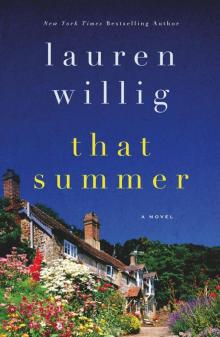 That Summer
That Summer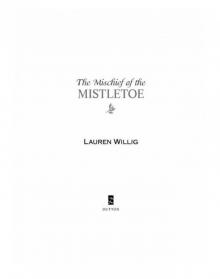 The Mischief of the Mistletoe
The Mischief of the Mistletoe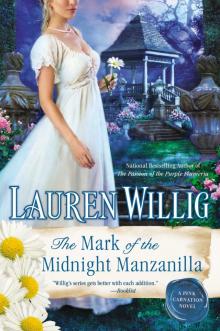 The Mark of the Midnight Manzanilla
The Mark of the Midnight Manzanilla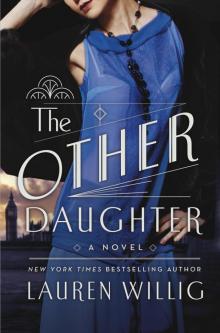 The Other Daughter
The Other Daughter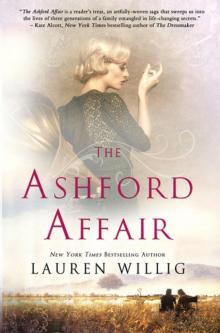 The Ashford Affair
The Ashford Affair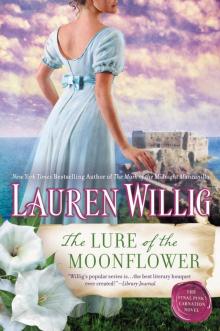 The Lure of the Moonflower
The Lure of the Moonflower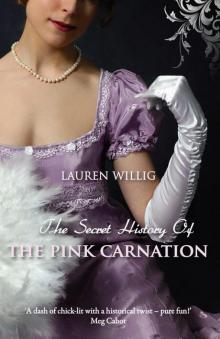 The Secret History of the Pink Carnation
The Secret History of the Pink Carnation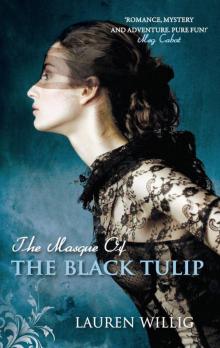 The Masque of the Black Tulip
The Masque of the Black Tulip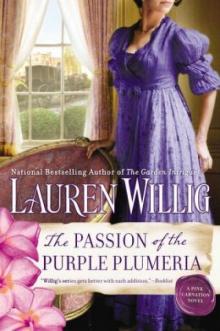 The Passion of the Purple Plumeria
The Passion of the Purple Plumeria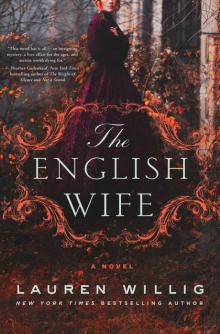 The English Wife
The English Wife The Garden Intrigue
The Garden Intrigue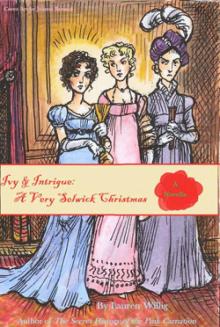 Ivy and Intrigue: A Very Selwick Christmas
Ivy and Intrigue: A Very Selwick Christmas The Orchid Affair
The Orchid Affair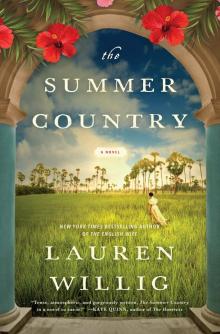 The Summer Country
The Summer Country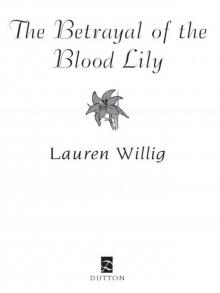 The Betrayal of the Blood Lily
The Betrayal of the Blood Lily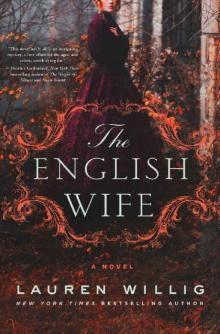 The English Wife: A Novel
The English Wife: A Novel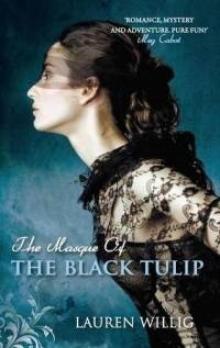 Masque of the Black Tulip pc-2
Masque of the Black Tulip pc-2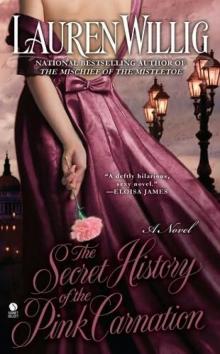 The Secret History of the Pink Carnation pc-1
The Secret History of the Pink Carnation pc-1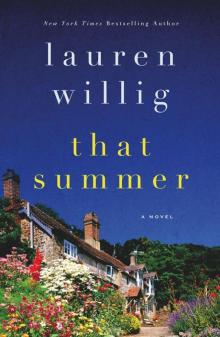 That Summer: A Novel
That Summer: A Novel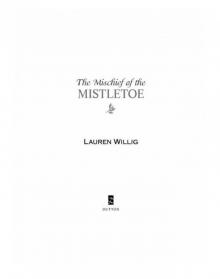 The Mischief of the Mistletoe: A Pink Carnation Christmas
The Mischief of the Mistletoe: A Pink Carnation Christmas